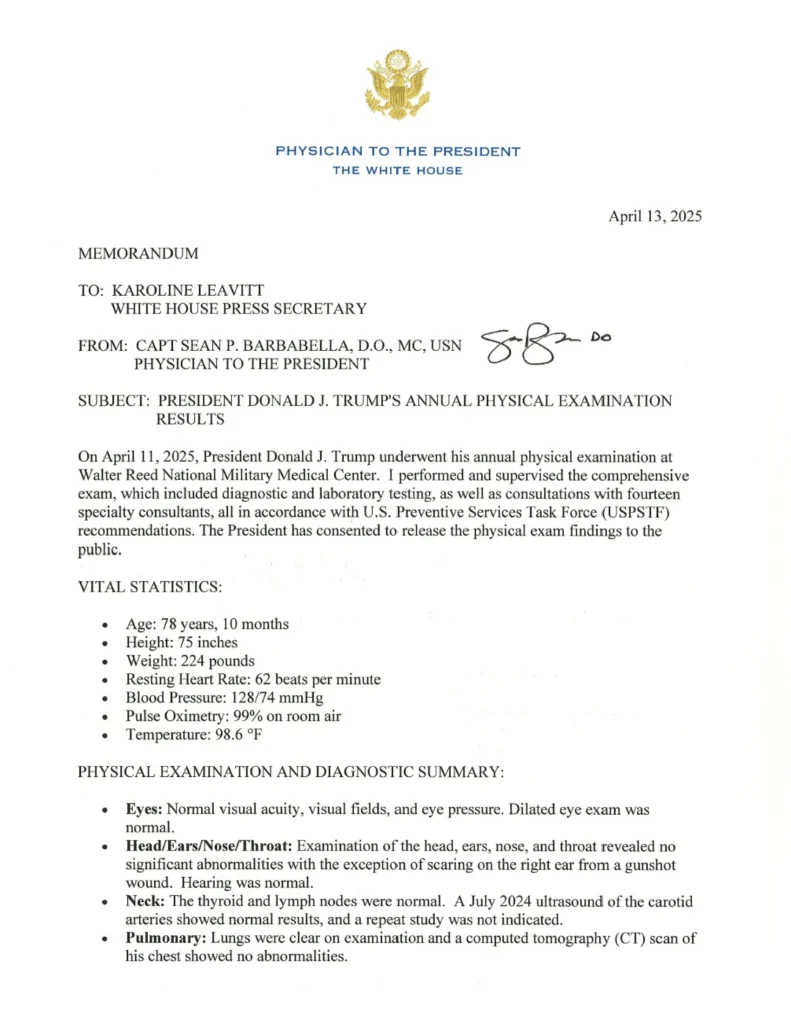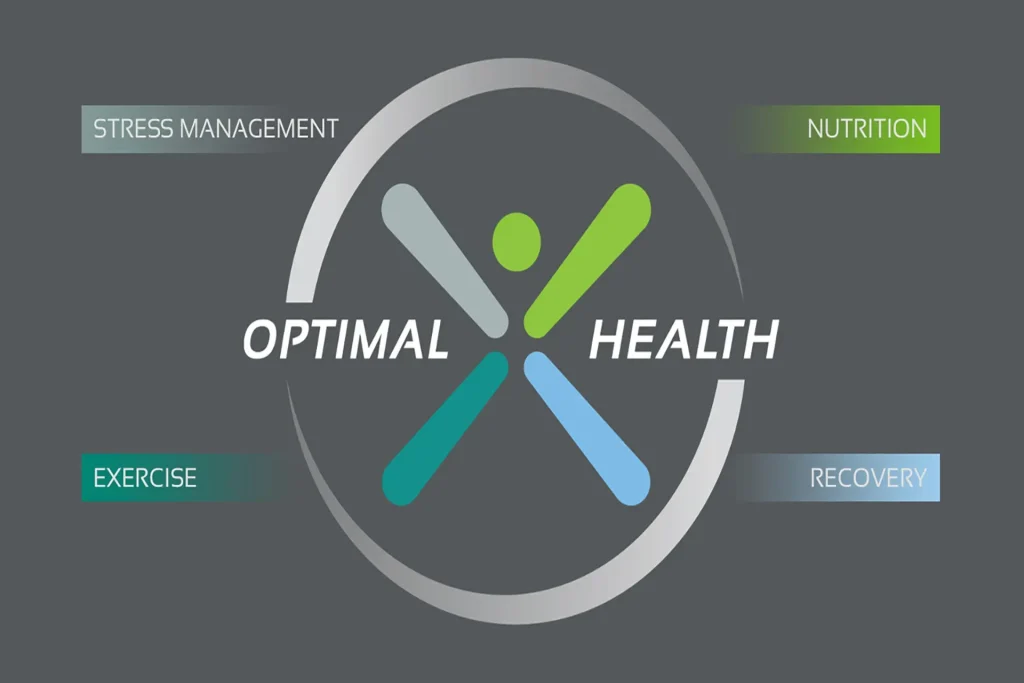The recent Trump health exam has drawn significant public interest, particularly regarding his overall health condition as he approaches 80 years old. According to a White House press release, this comprehensive medical examination revealed that President Trump is dealing with chronic venous insufficiency, a common yet manageable vein disorder. Despite the diagnosis, officials confirmed he is not facing any serious health issues, alleviating concerns that arose from photographs showing him with swollen legs. Press Secretary Karoline Leavitt emphasized that the president’s visible bruises are likely a result of frequent handshaking and routine aspirin intake. As such, the Trump health update paints a picture of a leader who remains fundamentally fit to serve, with no alarming findings reported after his evaluation.
In a recent assessment of the president’s physical state, the medical examination provided an essential snapshot of Donald Trump’s health status. Addressing speculation surrounding his well-being, the White House has confirmed that while there is a diagnosis of a benign vein condition, there are no indications of more severe health implications. The communications from the administration aim to reassure the public about the president’s vitality, stressing that typical age-related ailments like chronic venous insufficiency can be expected, yet they pose no immediate risk. This detailed disclosure sheds light on President Trump’s physical examination outcomes, reinforcing the notion that he remains capable and prepared for the demands of his office. As individuals age, regular check-ups become crucial, and this incident underscores the importance of transparency in governmental health updates.
Understanding Trump’s Recent Health Examination
President Donald Trump’s recent health examination has brought to light insights into his medical condition while alleviating concerns about more serious ailments. The examination, which was comprehensive, confirmed that Trump suffers from chronic venous insufficiency, a common vein disorder characterized by inadequate blood flow, primarily in the legs. This condition can lead to symptoms such as swelling, redness, and varicose veins. Importantly, the White House press release emphasized that aside from this diagnosis, Trump was cleared of more severe health issues, fostering reassurance about his overall wellness.
Karoline Leavitt, the White House Press Secretary, affirmed that the president’s recent swelling in the legs is not uncommon for someone of his age. She reported that Trump’s health is being meticulously monitored, reflecting a commitment to transparency about his health condition. The examination results, which revealed normal blood test results and proper cardiac functionality, reinstate confidence in Trump’s health status as he continues to fulfill his presidential duties.
Chronic Venous Insufficiency Explained
Chronic venous insufficiency (CVI) is a medical condition that affects blood circulation, primarily in the legs. It occurs when veins struggle to transport blood back to the heart efficiently, causing blood to pool in the lower extremities. This condition affects approximately 20% of adults, with a higher prevalence in older populations. Trump’s diagnosis fits within this framework, with the White House confirming that it is a benign condition that should not derail his ability to perform presidential responsibilities.
Health experts, such as those at the Cleveland Clinic, explain that CVI often develops due to a combination of genetic and lifestyle factors, which can range from prolonged standing to certain chronic diseases. The white house’s assessment of Trump’s condition underlines the importance of managing chronic ailments effectively to maintain a good quality of life, especially in older adults. The indications that Trump is not experiencing pain associated with CVI are further reassuring concerning his health during his tenure.
White House Confirms President Trump’s Health Update
In the latest briefing, the White House shared crucial updates regarding President Trump’s health, particularly following the public’s concern over his visual appearance in recent photographs. The press release clarified that what appeared to be swelling in Trump’s legs stems from chronic venous insufficiency. Press Secretary Karoline Leavitt detailed that Trump has been actively monitored, with assessments revealing no deeper issues, such as deep vein thrombosis or arterial diseases, which can have severe health implications.
Furthermore, Leavitt reassured the public that Trump’s vital signs and lab results fall within normal ranges, underscoring a positive outlook on his overall health. These updates not only counter speculation but also shine a light on the ongoing commitment the administration has to maintaining transparency about the President’s health condition, ensuring that the American people are kept informed.
The Relationship Between Aspirin and Bruising in Older Adults
Aspirin, commonly prescribed for cardiovascular health, has been noted to have side effects, including an increased tendency to bruise. In Trump’s case, Press Secretary Leavitt highlighted that the bruises seen on the back of his hands are likely linked to the president’s regular aspirin regimen, which is part of his preventative health strategy. This correlation between aspirin use and bruising is supported by medical literature that indicates that anticoagulants can affect blood coagulation, especially in older adults who may have more fragile skin and blood vessels.
While the visibility of bruises can raise concerns among the public, medical professionals emphasize the need for context; details such as frequent handshaking and regular aspirin intake help clarify potential causes. The White House’s proactive communication effectively addresses these health-related concerns, affirming that the president’s office remains vigilant about health monitoring and the implications of medical treatment.
Health Overview of President Trump Post-Examination
Following the recent health examination, President Trump has been declared to be in excellent health, a statement echoed by White House officials amid ongoing speculation regarding his age-related health concerns. The in-depth examination revealed normal cardiac function and overall well-being, according to physician assessments which complement the findings on Trump’s chronic venous insufficiency. Maintaining transparency about these findings is crucial for public assurance about the president’s health condition.
Press Secretary Karoline Leavitt affirmed that Trump’s ability to carry out presidential duties remains intact, with no acute health issues reported. This declaration serves not only to reassure the public but also underscores the importance of regular medical evaluations for individuals in high-pressure roles. The proactive measures taken by the White House medical team are essential in fostering trust and clarity surrounding the health of leaders.
The Importance of Routine Medical Checks for Leaders
Routine medical examinations are critical for leaders, not only for their personal health but also for public confidence in their leadership. As seen in President Trump’s case, comprehensive evaluations provide vital insights into health conditions that may affect performance. Regular check-ups are essential for early diagnosis and management of chronic issues like chronic venous insufficiency, which allows for timely intervention and appropriate care.
In leadership roles, maintaining transparency about health is equally important. Public figures are often subjected to scrutiny, making it crucial to keep constituents informed regarding their health status. The White House’s commitment to sharing Trump’s health information exemplifies a proactive approach to public relations and establishes trust between the administration and the public, reinforcing the idea that health is a priority.
Addressing Public Concerns Over Trump’s Physical Health
Public speculation about President Trump’s health has grown in light of his age and certain physical manifestations, such as visible swelling. Consequently, addressing public concerns through timely health updates, as provided by the White House, plays a vital role in assuaging fears. Clear communication regarding chronic venous insufficiency and the absence of serious health issues showcases the administration’s transparency and responsibility in informing citizens.
Moreover, the White House has taken a proactive stance in counteracting speculation by providing insights into the president’s health examination results. Instances of public concern are best managed through consistent and informative updates, creating a foundation of trust and confidence in leadership health. This proactive strategy is not only beneficial for Trump’s public image but also reinforces the importance of open dialogue regarding health in political contexts.
The Impact of Public Image on Health Perception
Public image plays a significant role in shaping perception regarding the health of leaders. In the case of President Trump, photographs showing any signs of physical changes can quickly lead to speculation about his health conditions. This reality underlines the importance of effective media communication and public relations strategies to convey accurate health information, which can counter negative narratives and alleviate unnecessary worry among constituents.
As Trump’s health updates reveal a largely positive prognosis despite minor chronic conditions, it signals to the public that transparent disclosures can mitigate fears. By showcasing regular health monitoring and an active response to any issues, the administration demonstrates a commitment to both the president’s and the public’s health concerns, reinforcing the notion that leaders must maintain competence and vigor even amid scrutiny.
Conclusion: Maintaining Public Trust through Health Transparency
In conclusion, the importance of health transparency in leadership cannot be overstated. The recent examinations and clear reporting concerning President Trump’s health status highlight a vital aspect of governance that directly influences public confidence. By openly discussing diagnoses such as chronic venous insufficiency and reassuring the public about ongoing health monitoring, the Trump administration embraces a model for how leaders can effectively manage their health narratives.
Maintaining public trust also involves regular updates and communication about any potential health issues, fostering a sense of stability and reliability. The findings from Trump’s recent examinations combined with proactive disclosures exemplify a transparent approach that aids in alleviating public anxiety. As health updates continue to draw attention, leaders must prioritize transparent communication strategies to reinforce their commitment to health and wellness.
Frequently Asked Questions
What were the findings of President Trump’s health exam regarding his medical conditions?
President Trump’s health examination revealed that he has been diagnosed with chronic venous insufficiency, a common vein disorder that affects circulation. However, the exam ruled out serious health issues, confirming he remains in excellent health overall.
How does chronic venous insufficiency affect President Trump’s health condition?
Chronic venous insufficiency affects blood flow in the legs, leading to symptoms like swelling, which President Trump has recently experienced. This condition is typically benign and common among individuals over the age of 70, and Trump is not currently experiencing any pain associated with it.
What reassurance did the White House provide about President Trump’s health update?
In the latest White House press release, Press Secretary Karoline Leavitt assured that President Trump is in excellent health, citing normal blood test results and an echocardiogram that showed no signs of heart failure or other severe illnesses.
What caused the bruises seen on President Trump’s hands during public appearances?
The bruises observed on President Trump’s hands are attributed to irritation from frequent handshaking and his regular use of aspirin, which can cause bruising. This was explained by Press Secretary Leavitt in response to recent concerns about his health.
How are the recent photographs of President Trump with swollen legs explained?
The swollen legs seen in recent photographs of President Trump are consistent with his diagnosis of chronic venous insufficiency. This condition can cause swelling, but it is not considered serious at this time according to the White House medical evaluations.
Was there any indication of serious health issues following President Trump’s medical examination?
No, the White House medical examination did not indicate any serious health conditions for President Trump. Tests showed normal cardiac function and no evidence of deep vein thrombosis or arterial disease.
What should the public understand regarding President Trump’s ability to perform his duties?
The White House has confirmed that President Trump is fully fit to carry out his presidential duties, maintaining that he remains in excellent physical health despite the recent diagnosis of chronic venous insufficiency.
| Key Points | Details |
|---|---|
| Thorough Medical Examination | President Trump underwent a comprehensive medical exam revealing a common vein disorder. |
| Common Vein Disorder Identified | Trump was diagnosed with chronic venous insufficiency, a benign condition common in older adults. |
| Swollen Legs Explained | Recent photos showing swollen legs prompted inquiry; Trump noticed this swelling in recent weeks. |
| No Serious Health Issues | Medical tests ruled out deep vein thrombosis and other serious conditions. |
| Normal Health Indicators | Blood tests and echocardiogram results are within normal limits, showing no signs of major health problems. |
| Aspirin Side Effects | Bruises on Trump’s hands are attributed to frequent handshaking and aspirin use, a standard cardiovascular prevention method. |
| Overall Assessment | White House reports Trump remains in excellent health, fully capable of fulfilling presidential duties. |
Summary
The Trump health exam revealed that the President is in excellent health despite a diagnosis of chronic venous insufficiency. This common vein disorder has been a topic of speculation due to recent photographs showing swelling in his legs. Press Secretary Karoline Leavitt emphasized that Trump is not experiencing pain and has routine checks that indicate normal health metrics. This reassurance about Trump’s health is crucial as he continues to fulfill his presidential responsibilities.



